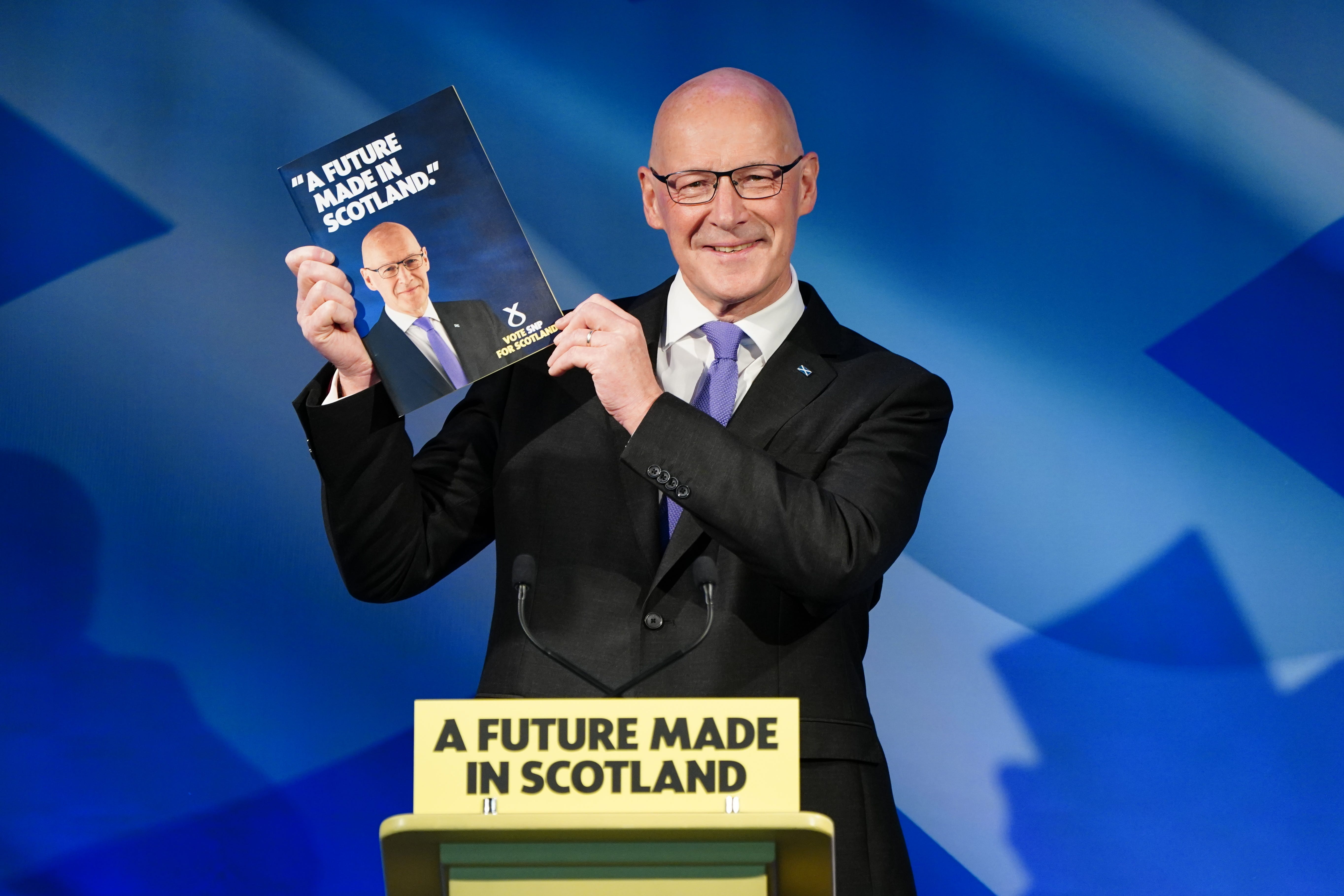Swinney refuses to predict future of independence movement if SNP loses majority
The First Minister said he would not comment on what might happen after July 4.

Your support helps us to tell the story
From reproductive rights to climate change to Big Tech, The Independent is on the ground when the story is developing. Whether it's investigating the financials of Elon Musk's pro-Trump PAC or producing our latest documentary, 'The A Word', which shines a light on the American women fighting for reproductive rights, we know how important it is to parse out the facts from the messaging.
At such a critical moment in US history, we need reporters on the ground. Your donation allows us to keep sending journalists to speak to both sides of the story.
The Independent is trusted by Americans across the entire political spectrum. And unlike many other quality news outlets, we choose not to lock Americans out of our reporting and analysis with paywalls. We believe quality journalism should be available to everyone, paid for by those who can afford it.
Your support makes all the difference.First Minister John Swinney has refused to say what will happen to the Scottish independence movement if the SNP loses its majority in Scotland on July 4.
The SNP leader fulfilled the promise both he and his predecessor Humza Yousaf made by putting the push for independence on the first page of the party’s General Election manifesto, which was launched in Edinburgh on Wednesday.
The document states: “Vote SNP for Scotland to become an independent country.”
The party’s position is to seek to give “democratic effect” to the will of the Scottish people if the SNP wins a majority of Scottish seats at Westminster, which Mr Swinney said on Wednesday means negotiating for another referendum to be held.
There is “no other way” to get to independence than through the ballot box, the First Minister added, saying: “We must never lose faith in the power of the democratic voice of the people of Scotland.”
But with polls suggesting Labour could be pulling ahead of the SNP, he refused to say what losing its majority would mean for the independence movement.
Despite being repeatedly asked about the possibility, Mr Swinney said he would not seek to “predict” the outcome of the July 4 vote.
Speaking to journalists after the launch, he said: “Let’s wait until July 5, we can have all those conversations then, but at this stage, if people want to make progress on the issue of independence they’ve got to vote for the SNP.”
The SNP leader also appeared to suggest the result of the 2021 Holyrood election, which saw a majority of pro-independence MSPs elected, is enough of a mandate to seek another referendum regardless of what happens next month.
“I think people in Scotland should have their democratic wishes respected,” he said.
“In 2021 they called for there to be a referendum on the question of independence as a consequence of electing a parliamentary majority committed to that particular objective.
“In this election, if people want to intensify the pressure for that to be the case, then their opportunity is to vote for the Scottish National Party to make that happen.
“I stress, that can only happen if votes for the SNP are cast, because votes for the SNP will be capable of delivering independence.”
In his speech to activists and journalists, the First Minister said: “Never let anyone tell you that independence is separate from people’s daily lives and concerns.
“It is fundamental to those lives and concerns.
“It is about where decisions about Scotland are made, decisions over our economy, our health service, our living standards.”
Mr Swinney said his party is not seeking “independence for its own sake”.
He continued: “Independence for the powers to protect our NHS and to help people through tough times. Independence for a stronger economy and happier, healthier lives. Independence for a better future for Scotland – made in Scotland – for Scotland.”
The SNP has spent the campaign accusing a future Labour government of needing to cut public services, by sticking to strict fiscal rules.
Mr Swinney’s party, however, proposes three new rules, including multi-year spending plans, a “net worth rule” which sought to take stock of the value of infrastructure investments rather than just the cost, and an upper limit on debt servicing costs.
Prime Minister Rishi Sunak accused the party of only focusing on “constitutional wrangling”.
He said: “Under the Conservatives right now, we’re investing record sums into the NHS and that will continue if we’re re-elected, with NHS spending and investment going up in real terms ahead of inflation every year at the next parliament.
“We’re also hiring more doctors and nurses, and training more for the future, and doing things differently by making sure people can see their pharmacists instead of their GP to get treatments for common ailments.
“All the SNP do is focus on constitutional wrangling. They’re the ones that aren’t focused on what people care about day to day.
“They have already made Scotland the highest tax capital of the UK, and if Labour are elected, they would just do the same, hike up everyone’s taxes, just like the SNP have done.
“A vote for anyone who’s not a Conservative candidate at this election is just a vote for higher taxes. I don’t want to see that happen. That’s not how you deliver financial security.”
Scottish Labour deputy leader Jackie Baillie said the party was “woefully out of touch”.
“After 17 years of broken promises and decline in government, no-one is buying the SNP’s latest string of half-baked and unserious pledges,” she said.
“This is a tired party with no fresh ideas and the wrong priorities – but change is possible.
“This election is our chance to remove the Tories from office and put Scotland’s voice at the heart of government.”